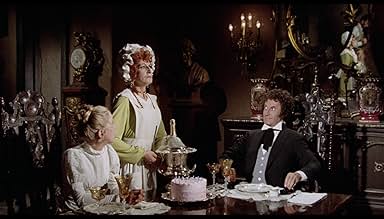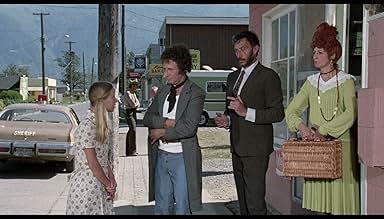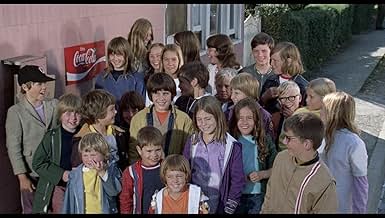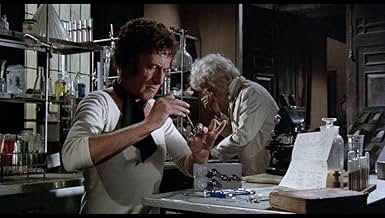Aggiungi una trama nella tua linguaA mute puppeteer uses a deceased scientist's invention to control dead bodies like puppets.A mute puppeteer uses a deceased scientist's invention to control dead bodies like puppets.A mute puppeteer uses a deceased scientist's invention to control dead bodies like puppets.
- Regia
- Sceneggiatura
- Star
- Candidato a 1 Oscar
- 1 candidatura in totale
Recensioni in evidenza
Shanks (1974)
*** (out of 4)
Leave it to William Castle, the ultimate trick master, to save his strangest film for last but that's pretty much what he's done with SHANKS. In the film, Marcel Marceau plays a deaf puppet master who takes over for his scientist friend in a bizarre experiment that allows one to control the dead like you would a puppet. Soon the once abused man becomes in control of everything he's ever wanted. This is a pretty bizarre little movie and I can't imagine it being a big disaster when originally released because it's doubtful too many horror fans wanted to see a horror movie without any violence, blood, spooks or anything like that. Instead of going for cheap thrills, Castle has instead pretty much created a film that is all atmosphere and there's so little dialogue that one could nearly call this a silent film. We even get title cards to explain some of the action so it's extremely close to being a silent. Castle's direction handles the material incredibly well and I'd probably argue that this is perhaps his best made movie. There aren't any gimmicks or tricks being thrown out and instead Castle appears to be wanting to prove to critics that he was able of creating a movie without them. The atmosphere of the film is incredibly thick as it really does seem like you're watching something that doesn't take place on Earth or set during any particular time period. Famous mime Marceau is excellent in his role and really delivers a remarkable performance. His turn at playing this mute is without question one of the best I've seen from any actor as he doesn't have one false step and there's never a single second where it seems like we're just seeing an actor play a deaf man. Tsilla Chelton and Philippe Clay are also excellent especially when they're the "puppets" as it was quite amazing to watch them do their thing. The cute Cindy Eilbacher is the perfect mix to be a friend to Marceau. This isn't a very well known movie, which is a shame but part of this might be due to the fact that it has yet to ever get an official release. Hopefully one day it will get a wider release and people will give the film a second shot because it certainly deserves it and I can't help but think had it been made somewhere between the 40s and the 60s then it would be looked at as a minor classic. Being lost in the 70s, the film is in major need of rediscovery.
*** (out of 4)
Leave it to William Castle, the ultimate trick master, to save his strangest film for last but that's pretty much what he's done with SHANKS. In the film, Marcel Marceau plays a deaf puppet master who takes over for his scientist friend in a bizarre experiment that allows one to control the dead like you would a puppet. Soon the once abused man becomes in control of everything he's ever wanted. This is a pretty bizarre little movie and I can't imagine it being a big disaster when originally released because it's doubtful too many horror fans wanted to see a horror movie without any violence, blood, spooks or anything like that. Instead of going for cheap thrills, Castle has instead pretty much created a film that is all atmosphere and there's so little dialogue that one could nearly call this a silent film. We even get title cards to explain some of the action so it's extremely close to being a silent. Castle's direction handles the material incredibly well and I'd probably argue that this is perhaps his best made movie. There aren't any gimmicks or tricks being thrown out and instead Castle appears to be wanting to prove to critics that he was able of creating a movie without them. The atmosphere of the film is incredibly thick as it really does seem like you're watching something that doesn't take place on Earth or set during any particular time period. Famous mime Marceau is excellent in his role and really delivers a remarkable performance. His turn at playing this mute is without question one of the best I've seen from any actor as he doesn't have one false step and there's never a single second where it seems like we're just seeing an actor play a deaf man. Tsilla Chelton and Philippe Clay are also excellent especially when they're the "puppets" as it was quite amazing to watch them do their thing. The cute Cindy Eilbacher is the perfect mix to be a friend to Marceau. This isn't a very well known movie, which is a shame but part of this might be due to the fact that it has yet to ever get an official release. Hopefully one day it will get a wider release and people will give the film a second shot because it certainly deserves it and I can't help but think had it been made somewhere between the 40s and the 60s then it would be looked at as a minor classic. Being lost in the 70s, the film is in major need of rediscovery.
And that's not an exaggeration. I searched for this movie for a long time, and I'm glad I found it. Marcel Marceau plays Shanks, a deaf puppet maker, and Walker, an old scientist who has discovered the secret of reanimating the dead. He plays both beautifully, using his pantomime skills to achieve silent movie style acting. In fact, that's what this movie reminds me of - a silent fairy tale (the use of title cards to introduce scenes further suggests this), with a little George Romero thrown in! It's incredible that something this abstract and individualistic was made; I wish more movies would be as bold. The opening credits sequence, with tinted photos of kids watching Shanks' puppet show while the weird Oscar nominated (!) music plays is incredibly strange, memorable, and disturbing.
William Castle, of all people, directed. This movie shows, more than any other, that he was more than just the "King of Gimmicks". To see such an expressionistic and disturbing vision.......is to regret that this was his final film as director.
William Castle, of all people, directed. This movie shows, more than any other, that he was more than just the "King of Gimmicks". To see such an expressionistic and disturbing vision.......is to regret that this was his final film as director.
When one thinks of Marcel Marceau they think of the world's most famous mime. A performer who has entertained millions of people throughout the years with his mastery of pantomime. You certainly don't think of him as a manipulator of dead bodies!! But that's what he is here in this very strange film. He plays Malcolm Shanks, a mime who loves to entertain the neighborhood children. He lives with his sister & brother-in-law who are a shrew & a drunk & abuse him constantly. He is hired by a scientist who has perfected the art of reanimating the dead. I must stop for a second and let anyone who is reading this know that the film, while it sounds intriguing, doesn't play out the way you would think. It is at heart a fairy tale. A morality story perhaps. But most definitely NOT a horror story. To continue, The scientist dies & having learned his secrets while working with him, Malcolm reanimates his corpse & becomes very proficient at it. I'm not gonna get any deeper into it at this point. Suffice it to say that more than a few people get their corpses reanimated by Malcolm and no good can come from that.....
Marceau plays both Malcolm & The Scientist(Walker) & performs admirably in both roles. There is a scene where Malcolm learns to animate Walker's facial muscles that is very effective. He goes from slack-jawed to smiling so slowly & eerily that at first you think the film is frozen. Almost like time lapse photography. It really shows off Marceau's expertise. There is very little dialogue in the film. It plays like a silent film(It even has title cards)because it is 90% silent. The score by Alex North is therefore very important to the tone of the film, & it is very effective in conveying the mood that the filmmakers were trying to achieve. It was so effective it was nominated for an academy award.
I enjoyed the film but there are VERY SLOW PASSAGES in it. So slow that it will turn many people off. It also ends very curiously. It is a very odd but lyrical film that is a great attempt at a Grim fairy tale. But ultimately it fails because of it's terrible pacing & low budget. You might dig it if you're willing to accept it's idiosyncracies. If not...well give it a try anyway. Who knows??
Marceau plays both Malcolm & The Scientist(Walker) & performs admirably in both roles. There is a scene where Malcolm learns to animate Walker's facial muscles that is very effective. He goes from slack-jawed to smiling so slowly & eerily that at first you think the film is frozen. Almost like time lapse photography. It really shows off Marceau's expertise. There is very little dialogue in the film. It plays like a silent film(It even has title cards)because it is 90% silent. The score by Alex North is therefore very important to the tone of the film, & it is very effective in conveying the mood that the filmmakers were trying to achieve. It was so effective it was nominated for an academy award.
I enjoyed the film but there are VERY SLOW PASSAGES in it. So slow that it will turn many people off. It also ends very curiously. It is a very odd but lyrical film that is a great attempt at a Grim fairy tale. But ultimately it fails because of it's terrible pacing & low budget. You might dig it if you're willing to accept it's idiosyncracies. If not...well give it a try anyway. Who knows??
I am sure the cult followers of this film will not like my review, but that's partly what makes this film a cult classic--either you like it or you don't. Even with nothing else to do on a late Friday night, and a stiff drink, a bag of chips, and the need to escape from the cares of the week, I found myself flipping to other channels during the painfully slow segments of this film. The (un)editing and overall incredibly slow flow of this story made it a struggle to stay tuned in. If properly edited, it could have easily been a half-hour "Tales from the Dark Side." In fact, the quality of the shots and lighting made me convinced that it was a made-for-TV film.
All that said, it's interesting to see the movie once, as if it was assigned in a "70s film appreciation" class. But be prepared with something else to do--like sorting receipts for taxes, or playing solitaire.
You may find yourself yelling at the screen--"How many times does the editor have to cut back to his face? We've got the point! Now move on with the action!!!" and, "could he walk down that hallway any slower???" My favorite part of the movie was watching the great body movement of the actors who played the re-animated zombies. And it's funny that Marcel was NOT the best one of these!
All that said, it's interesting to see the movie once, as if it was assigned in a "70s film appreciation" class. But be prepared with something else to do--like sorting receipts for taxes, or playing solitaire.
You may find yourself yelling at the screen--"How many times does the editor have to cut back to his face? We've got the point! Now move on with the action!!!" and, "could he walk down that hallway any slower???" My favorite part of the movie was watching the great body movement of the actors who played the re-animated zombies. And it's funny that Marcel was NOT the best one of these!
Producer-director William Castle may have too often been dismissed in critical circles as a Grade Z Hitchcock or for having been little more than a gimmick-laden showman during his peak years, but nobody could have sensibly predicted that he would eventually be saving his greatest trick for last; in fact, SHANKS was Castle's directorial swan-song and it might well be his best film as well!
The artform of the mime is one that, understandably perhaps, hasn't been treated much on the silver screen (in this way, it elicits comparison with the classic ballet-oriented THE RED SHOES [1948] which, similarly, adopted a stylized look throughout mixed with an adroit sense of the macabre); the most famous example is, of course, Jean-Louis Barrault's unforgettable Baptiste in Marcel Carne's LES ENFANTS DU PARADIS (1945) and Marcel Marceau (who has died fairly recently) can be said to be the only mime artist that is renowned worldwide. Consequently, it comes as little surprise to see him feature in a couple of cult movies over the years Roger Vadim's BARBARELLA (1968) and Mel Brooks' all-star comedy SILENT MOVIE (1976), where his presence extended to just a cameo in which, ironically, he utters the only word of dialogue in the whole movie!
SHANKS is another thing entirely: Marceau not only has a dual role and does the choreography but, for the most part, is virtually the whole show. As on-screen support, he has three talented actors Tsilla Chelton and Philippe Clay (who are very adept at miming themselves) and the young Cindy Eilbacher. The film was produced by Steven North, son of composer Alex who received another Oscar nomination (his twelfth) for his brilliantly inventive score by turns playful, poignant and brooding which, in a film like this, with very little dialogue and the intermittent use of intertitles, is as important as the on-screen characters themselves. Castle (who even has an amusing, unbilled cameo as a storekeeper) also employed other renowned Hollywood veterans behind the camera here, namely cinematographer Joseph Biroc (their third collaboration) and production designer Boris Leven.
The film itself has rightly been described as one of the strangest ever made (the subtitle "A Grim Fairy Tale" is most apt!): it deals with a deaf-mute puppeteer (Marceau, naturally) who, abused by his harridan sister and her boozing partner, takes comfort in his friendship with a little girl he meets at the fair and an eccentric dying scientist (also Marceau, made up to look almost Caligari-like) who experiments with reanimating dead bodies (most notably a frog) via two portable electronic devices. After the scientist dies and is buried, the puppeteer takes possession of the re-animating devices himself and, inevitably, they come in handy when his relatives die (one he kills himself in self-defense at the scientist's mansion with the help of a re-animated rooster and the other when beside herself at Marceau's lateness is mowed down by a speeding car outside their house in the middle of the night!); he takes them shopping and has them wait on him and perform tricks when he invites the girl to the doctor's mansion! Their idyllic tryst is short-lived, however, when a gang of bikers burst in on them to treat a wounded member of their party
Watching SHANKS (which is the puppeteer's surname, by the way) right after Robert Hartford-Davis' CORRUPTION (1968), I couldn't help but be reminded of that film's analogous last segment (right down to the 'dreamy' coda); here, however, Castle has a trump card up his sleeve when a biker steals one of the doctor's electronic devices and fools around with the zombified 'servants' the puppeteer, on the other hand, re-animates the scientist who, together with the servants now back in his control, beat up the gang. The narrative seems simple enough on paper, but the film is very much a unique experience (albeit an acquired taste, given the occasional longueurs brought on by its deliberate pace) amusing, surreal, weird and disturbing. Certainly among the highlights is the puppeteer's re-animation of the scientist whose movements made me think of a Jekyll/Hyde transformation as performed by Jimmy Cagney!!
Unfortunately, the print quality left much to be desired: it seemed like a tenth-generation VHS copy, with the detail all soft and fuzzy and the picture excessively dark to boot; being a Paramount film, one hopes that Legend Films or, better still, Criterion will eventually get the opportunity to give this bizarre gem a decent release and, consequently, the exposure it greatly deserves since Paramount themselves seem unwilling to do anything with it!
The artform of the mime is one that, understandably perhaps, hasn't been treated much on the silver screen (in this way, it elicits comparison with the classic ballet-oriented THE RED SHOES [1948] which, similarly, adopted a stylized look throughout mixed with an adroit sense of the macabre); the most famous example is, of course, Jean-Louis Barrault's unforgettable Baptiste in Marcel Carne's LES ENFANTS DU PARADIS (1945) and Marcel Marceau (who has died fairly recently) can be said to be the only mime artist that is renowned worldwide. Consequently, it comes as little surprise to see him feature in a couple of cult movies over the years Roger Vadim's BARBARELLA (1968) and Mel Brooks' all-star comedy SILENT MOVIE (1976), where his presence extended to just a cameo in which, ironically, he utters the only word of dialogue in the whole movie!
SHANKS is another thing entirely: Marceau not only has a dual role and does the choreography but, for the most part, is virtually the whole show. As on-screen support, he has three talented actors Tsilla Chelton and Philippe Clay (who are very adept at miming themselves) and the young Cindy Eilbacher. The film was produced by Steven North, son of composer Alex who received another Oscar nomination (his twelfth) for his brilliantly inventive score by turns playful, poignant and brooding which, in a film like this, with very little dialogue and the intermittent use of intertitles, is as important as the on-screen characters themselves. Castle (who even has an amusing, unbilled cameo as a storekeeper) also employed other renowned Hollywood veterans behind the camera here, namely cinematographer Joseph Biroc (their third collaboration) and production designer Boris Leven.
The film itself has rightly been described as one of the strangest ever made (the subtitle "A Grim Fairy Tale" is most apt!): it deals with a deaf-mute puppeteer (Marceau, naturally) who, abused by his harridan sister and her boozing partner, takes comfort in his friendship with a little girl he meets at the fair and an eccentric dying scientist (also Marceau, made up to look almost Caligari-like) who experiments with reanimating dead bodies (most notably a frog) via two portable electronic devices. After the scientist dies and is buried, the puppeteer takes possession of the re-animating devices himself and, inevitably, they come in handy when his relatives die (one he kills himself in self-defense at the scientist's mansion with the help of a re-animated rooster and the other when beside herself at Marceau's lateness is mowed down by a speeding car outside their house in the middle of the night!); he takes them shopping and has them wait on him and perform tricks when he invites the girl to the doctor's mansion! Their idyllic tryst is short-lived, however, when a gang of bikers burst in on them to treat a wounded member of their party
Watching SHANKS (which is the puppeteer's surname, by the way) right after Robert Hartford-Davis' CORRUPTION (1968), I couldn't help but be reminded of that film's analogous last segment (right down to the 'dreamy' coda); here, however, Castle has a trump card up his sleeve when a biker steals one of the doctor's electronic devices and fools around with the zombified 'servants' the puppeteer, on the other hand, re-animates the scientist who, together with the servants now back in his control, beat up the gang. The narrative seems simple enough on paper, but the film is very much a unique experience (albeit an acquired taste, given the occasional longueurs brought on by its deliberate pace) amusing, surreal, weird and disturbing. Certainly among the highlights is the puppeteer's re-animation of the scientist whose movements made me think of a Jekyll/Hyde transformation as performed by Jimmy Cagney!!
Unfortunately, the print quality left much to be desired: it seemed like a tenth-generation VHS copy, with the detail all soft and fuzzy and the picture excessively dark to boot; being a Paramount film, one hopes that Legend Films or, better still, Criterion will eventually get the opportunity to give this bizarre gem a decent release and, consequently, the exposure it greatly deserves since Paramount themselves seem unwilling to do anything with it!
Lo sapevi?
- QuizAlex North used parts of his rejected score for 2001: Odissea nello spazio (1968) for this film. For example, the main title music was originally composed for the space station phone call sequence of 2001, but here rearranged with a female vocalist added.
- BlooperAfter Mrs. Barton moves Celia's placemat, Malcolm cocks her body to her left. In the following shot, she's cocked to her right.
- Curiosità sui creditiRight before the closing credits roll, a quote from William Makepeace Thackeray is featured: "Let us shut up the box and the puppets, for our play is played out."
- ConnessioniFeatured in Spine Tingler! The William Castle Story (2007)
I più visti
Accedi per valutare e creare un elenco di titoli salvati per ottenere consigli personalizzati
- How long is Shanks?Powered by Alexa
Dettagli
Contribuisci a questa pagina
Suggerisci una modifica o aggiungi i contenuti mancanti




























